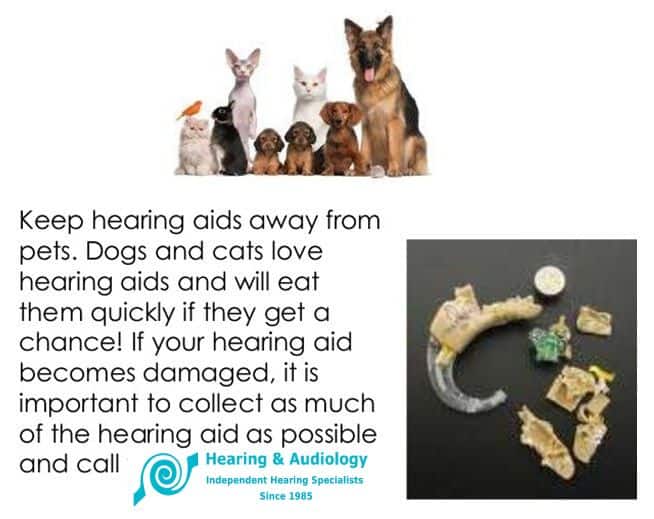Keeping your pet safe from hearing aid hazards

Keeping your pet safe from hearing aid hazards
Contributed by Lauren Clason, staff writer for Healthy Hearing | Tuesday, May 6th, 2014
Some dogs will eat anything they can get their paws on: your child’s box of crayons, a forgotten Pop-Tart, the baseboards, or the grease can underneath the grill. Needless to say, their diet isn’t always what it should be, so it’s important to recognize the hazards hearing aids and hearing aid batteries pose to your pet’s health.
Hearing aids are easy enough to swallow and the batteries can pose a significant health risk to anyone or any animal that ingests them. Dogs have been known to chew on and swallow hearing aids, particularly if they’ve shown any interest in or annoyance from the whistling or electronic sounds that a hearing aid emits. Cats could mistake them for a toy and bat them around the house.
If you want to learn more about hearing aids, check out our resources:
2. The Best Hearing Aids On The Market
3. Guide to Choosing Hearing Aids
4. Analog Hearing Aids vs Digital Hearing Aids
If your pet has swallowed hearing aid batteries, there are several symptoms to look for:
- Red and raw tongue, or whitish-gray from dead skin,
- Heavy drooling or vomiting,
- Unusually quiet behaviour or crying, and
- Refusal to eat or extremely slow chewing.
These symptoms can be delayed up to twelve hours. When a dog or cat punctures a battery, the corrosive liquid inside can damage its throat and oesophagus. Charlotte Means, a veterinary toxicologist with the ASPCA, says small amounts of milk can help dilute the liquid if the ingestion was recent. Too much, on the other hand, can cause diarrhoea.
The safest course of action, of course, is to take your pet to the vet. If there are pieces of the hearing aid or battery present in the stomach, surgery may be necessary. Alkaline batteries can cause burns on the tongue, throat and stomach lining. Immediate action is necessary once you’ve discovered your pet has swallowed a battery.
Besides the health risks, there are financial factors to consider. Hearing aids are expensive enough without throwing in the cost of a veterinarian bill; each one can cost anywhere from several hundred to several thousand dollars. That’s expensive catnip!
Be sure not to leave your hearing aids or batteries out where your pet can get them. Store hearing aids in a secure place out of reach of your pet. Proper storage includes drawers, cabinets and other containers that are closed and inaccessible to both pets and children. Do not leave them out on counters or nightstands where they could be easily knocked off or gobbled up by a furry friend.
Also, make a point of disposing any old hearing aid batteries properly once you replace them. Some businesses offer battery recycling programs. Keep them away from extreme heat and do not dispose of them in a fire, as they could explode and release toxic material.
Due diligence will prevent your pet from a lot of pain and an unwanted trip to the emergency room. While hearing aid manufacturers strive to make their products as safe as possible for everyone, including children and pets, the devices are still small and contain hazardous materials. The majority of batteries today do not contain mercury, but they are still dangerous if swallowed.
If your hearing aid is properly stored, your dog won’t have to learn the hard way that batteries aren’t treats.


